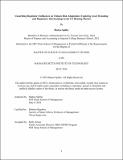Unearthing Regulatory Influences on Climate Risk Adaptation: Exploring Asset Stranding and Regulatory Shortcomings in the US Housing Market
Author(s)
Spiller, Matteo
DownloadThesis PDF (3.287Mb)
Advisor
Rigobon, Roberto
Terms of use
Metadata
Show full item recordAbstract
Financial institutions have not yet exhaustively assessed the implications that ESG risk may pose to the financial industry despite anthropogenic temperature change being duly and scientifically described in the Paris Agreement in December 2015 (Schellnhuber et al., 2016). Both banks and insurance companies will be impacted, especially in their respective real estate portfolios, and for this reason, the current risk management practices should evolve in order to exhaustively embed these scenarios in their stress testing methodologies (Jung et al., 2021). On top of this, several studies identified robust evidence of long-term growth losses for both poor and rich countries driven by natural disasters. These future climate change implications have been estimated at roughly $9.7 trillion (Hsiang & Jina, 2014).
Economic growth and climate change are two closely interconnected variables whose interplay will become more and more important in the future since, as an example, higher temperatures considerably reduce economic growth (Dell et al., 2012) and political stability (Hsiang et al., 2013).
This thesis delves into the complex regulatory frameworks that will shape the financial sector, seeking to understand how politics shape and influence resilience and sustainability while exposing financial institutions to a new set of risks (Buhr, 2016), such as stranded assets and new crisis scenarios that could undermine the stability of the entire financial system. As of today, the lack of unified definitions and consensus has led financial institutions to implement ad-hoc methodologies creating discrepancies among them and a lack of unified interpretability of the underlying results.
Europe has made considerable improvements to its regulatory framework and is moving toward a homogenous regulatory landscape (Baumuller & Grbenic, 2021). Meanwhile, US political discourse has slowed down the implementation of essential regulations which are required not only by financial institutions but also by multiple stakeholders including investors, regulatory bodies, local entities, and supranational organizations (Dunlap & McCright, 2010). Numerous non-binding guidelines have emerged setting the stage for a more comprehensive and detailed Climate Act with similar magnitude to the Dodd-Frank Act.
This study’s conclusion highlights the need for additional regulations and guidelines from supervisory authorities on top of recommending key approaches and areas of study not only for financial institutions but also for future research. As such, these will need to provide the foundation for the next regulatory developments considering both a systematic shift toward a low-carbon economy and a delayed abrupt transition to mitigate the potential implications that could undermine financial stability.
Date issued
2024-05Department
Sloan School of ManagementPublisher
Massachusetts Institute of Technology